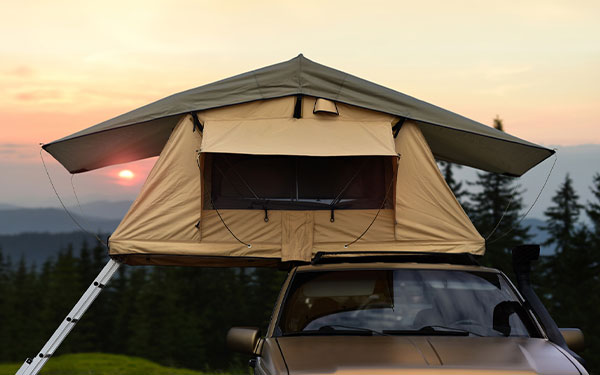If you enjoy camping, you understand the importance of having the proper gear with you on your adventures. You may have a trusted tent or reliable sleeping bag you never leave without. Regardless, if you don’t own an RV, you have probably considered it if you go camping regularly. But what if you don’t currently have the budget for an RV? Or what if you solo camp, so you don’t need a lot of extra space? If this sounds like you, a rooftop tent may be what you’re looking for.
Although not recreational vehicles, rooftop tents can act as a stepping stone between your outdoor interests and RV life. Sure, they don’t have all the gadgets you’ll find in a Class A rig, but they still get the job done. If you’re considering purchasing a rooftop tent, we’ll cover some basics you should know before purchasing.
The Benefits of Owning a Rooftop Tent
As their name suggests, rooftop tents are camping tents that attach to the roof of a vehicle. Rooftop tents come in a variety of shapes and sizes, with many tailored for specific vehicle sizes. It’s even possible to find a tent that can fit on top of a compact car. However, although many outdoor enthusiasts could benefit from purchasing a rooftop tent, it may not be the best option for everyone.
Rooftop Tents: The Pros
- Setup: A major pro of rooftop tents is that many are easy to assemble. Unlike traditional tents, many roof tents require undoing a few latches to release the tent upward. Once up, your tent is ready for use.
- Durability: Because they’re designed to remain on the roof of a car, these types of tents are typically made from durable materials.
- Height: If you’ve been camping before, finding a flat space to pitch your tent is key. With rooftop tents, you don’t have to worry about rocks, weather changes, or critters since you’ll be off the ground.
- Freedom: Rooftop tents allow you a little more freedom regarding where to camp. If your car can make it there, so can you.
Rooftop Tents: A Few Cons
- Cost: This could be a pro for some looking for a middle ground between classic camping and RV camping, but rooftop tents are significantly more expensive than a standard tent but cheaper than an RV or travel trailer. You can expect to pay between $1,000-$4,000+.
- Gas Mileage: One aspect of roof tents many don’t think about is its effect on your car’s gas mileage. Since they’re mounted on top of your vehicle, it could cause increased drag when traveling.
- Attachment: Attaching and removing a roof tent between camping trips can be a hassle.
How to Choose Your Rooftop Tent
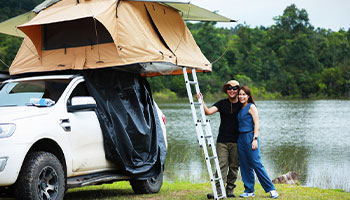
Before you purchase a rooftop tent, you’ll need to ensure a few things. For starters, your vehicle will need to have a roof rack. Without one, you won’t have any secure means of attaching your roof tent to the top of your car.
Additionally, you’ll need to find a tent that your car can support. Since these types of tents can easily surpass 100 pounds, understanding your car’s carrying limits will help narrow your options down, especially for those with smaller vehicles. Choosing a tent that your car cannot support is extremely dangerous. You’ll need to understand two weight limits: dynamic and static.
Dynamic weight represents how much weight your car can handle on its roof while moving. Your rooftop tent must weigh less than your car’s dynamic weight limit to prevent accidents or damage to your vehicle when it is in motion. Installed an aftermarket roof rack? You’ll need to check the rack’s owner’s manual for the same weight specification.
Static weight represents how much weight your car can handle while parked. Your car’s static weight will often exceed your dynamic limit since vehicles are designed to withstand rollover accidents. When determining if your tent meets your static weight limit, be sure to calculate the total planned weight, including the tent, occupants, and any gear, to confirm you have the proper support.
Finally, don’t forget to measure your roof’s dimensions. Some tents are designed for smaller vehicles, so knowing this will help you along your search.
Can I Insure My Rooftop Tent?
Although cheaper than most RVs, rooftop tents are still fairly expensive, so you’ll want to have them insured in addition to any manufacturer warranty. When you modify a vehicle, you must contact your insurance company to protect your assets adequately. Contacting your insurer will help you get the information you need regarding whether your tent can be covered under your current insurance policy. Some providers have customer parts and equipment coverage that will cover items such as rooftop tents.
You aren’t entirely out of luck if you can’t add it to your auto policy. You can also use your residential insurance to insure your rooftop tent. Most residential insurance policies include coverage for your personal property, even if it was stolen from a car or when you are traveling. However, remember that some policies require you to specifically list or “schedule” valued items for them to be covered. Always speak with your insurance provider before assuming you have coverage.
3 Rooftop Tents to Consider
1: Top Pick: iKamper Skycamp 3.0 Mini
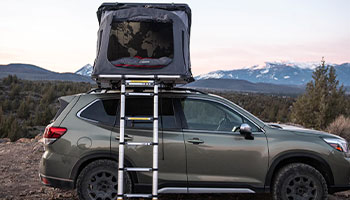
Price: Starts at around $3,700
If you’re looking for a brand that manufactures quality rooftop tents, look no further than iKamper. Although their tents can be a bit more expensive, they have stellar reviews and a wide range of tents that can fit any vehicle. What makes these tents our number one pick is that they feature a hardshell pop-up design, which makes them durable yet easy to set up. The tent comes with a ladder to help you get up and out quickly. The Skycamp Mini sleeps two, but there is a larger version that can accommodate up to 4 occupants.
2. Top Pick for Smaller Cars: Thule Foothill
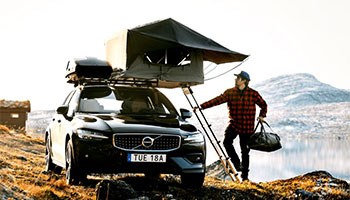
Price: Starts at $1,999.
One of our favorite tents for compact cars is Thule’s Foothill 2-person camper. When folded, this roof tent has a width of just 61 cm (~2ft), making it one of the most compact tents on the market. Plus, you can set up this tent without using your entire roof rack, making storing additional gear on the roof possible when camping. Its smaller design makes it compatible with smaller cars, so you won’t need an SUV or truck to use this rooftop tent.
3. Top Budget Pick: Smittybilt Overlander Tent XL
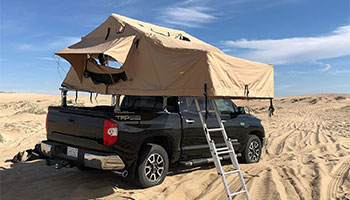
Price: Starts at $1,350
Need a budget option to start off? Consider Smittybilt’s Overlander XL tent. This tent is designed to sleep 3 to 4 people and is built from waterproof materials. This tent sets up in minutes and will give you the space you need to have a comfortable night’s sleep after a long day of exploring.
Learn More About RV Life
Whether you are interested in becoming an RVer or simply want to discover more adventures, our blog has plenty of resources you need to kick-start your journey. Head over to our RV destinations section to learn more about some of the best camping locations to visit, no matter what your preferred camping style is.
The information in this article is obtained from various sources and offered for educational purposes only. Furthermore, it should not replace the advice of a qualified professional. The definitions, terms, and coverage in a given policy may be different than those suggested here. No warranty or appropriateness for a specific purpose is expressed or implied.
